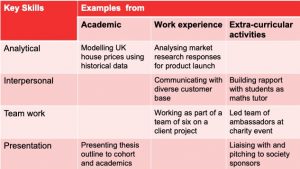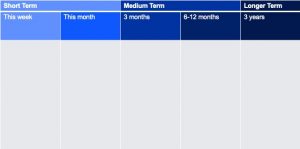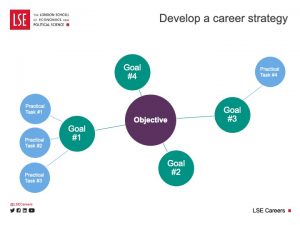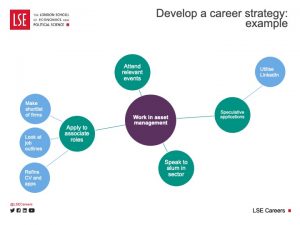In a previous blog, we deconstructed the common perception of a career plan or a career path where we tend to believe that we need to take a particular road and take certain steps to get to our final destination. However:
oftentimes, we find ourselves taking the road less travelled, taking shortcuts by meandering through smaller streets. In other words, don’t be afraid to walk the off-beaten path, after all, it may bring you to your goals faster.
In this blog, we’re bringing it all together to create a strategy in order for you to transition into your next career stage as seamlessly as possible.
Re-envisioning yourself and your career
You should always think back on your values and skills. This is so you have a better understanding of what you can contribute to that career equally as much as what that career path can offer you back.
Auditing your skills
Consider your transferable or unique skills. In your field of interest, are you lacking any skills? Start filling in the gaps and figure out what other necessary preparation you have to undertake. 
This is not only important in terms of aligning yourself in a particular job, it’s also good practice for when you start writing out your CV and job applications where your skills and experiences are situated under the spotlight.
Feeling in-between
Are you feeling uncertain? It’s very common to feel this way. Working on your career isn’t a once-in-a-life-time undertaking. You will constantly find opportunities for growth and develop new interests and passions.
Lifelines, the career journey
Your career journey is an ever-growing, non-linear, and continuous process. When it comes to mapping your career progress, some points will be more positive or satisfying than others.
As mentioned before, it’s perfectly normal and common to develop new interests and passions in your whole life course. A career you once held dear to your heart might not be the career you want to pursue any longer.
Re-inventing and developing your own career strategy
After all of the self-reflection, the next step is developing your very own career strategy. Depending on which stage you are at in your career planning, you might be at a stage where you’re ready to start doing practical tasks/actions. These include:
Companies and organisations: identifying job sites, signing up for email alerts, building a shortlist, browsing LSE Careers’ sector pages, speculative approaches, social media following and attending webinars.
Networking: LinkedIn, informational interviewing, following up after events and identifying shadowing opportunities.
Learning: skills, languages, identifying gaps from job descriptions, improving commercial awareness and finding volunteering opportunities.
Attend and browse: LSE Career events, other events at LSE, company events, open days and conferences.
Following is a visual example:
All of these are important for building your career strategy, feel free to book an appointment with one of our career consultants to help you in any of these steps.
Developing a career strategy
As important as it is to give yourself time to plan and strategise, giving yourself a time frame is essential to bridging your plans and turning plans into actions. The image below is an example for a template for your career strategy. You can also download and print this template for your own usage as well.
 Be generous with yourself when planning and scheduling your career path. Only start aiming to shorten the time frame once you’ve gotten used to the process. There’s no rush and don’t fall into peer pressure.
Be generous with yourself when planning and scheduling your career path. Only start aiming to shorten the time frame once you’ve gotten used to the process. There’s no rush and don’t fall into peer pressure.
Remember: career indecision is okay! It exposes you to opportunities, events and pathways you may not have considered.
If you find yourself needing more guidance on how to plan your career (or where to start), you can always speak with our career consultants here at LSE Careers. Book your confidential one-to-one appointment on CareerHub.
Note: This blog is the second part of a two-part blog series from our Career planning in a challenging context event. Read the first part here.






